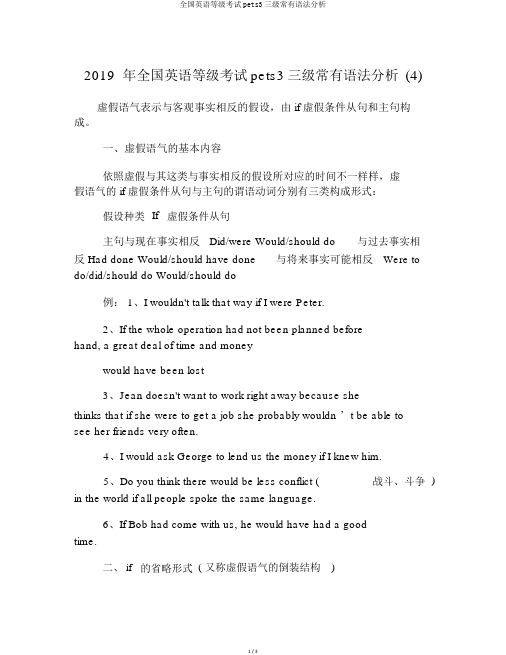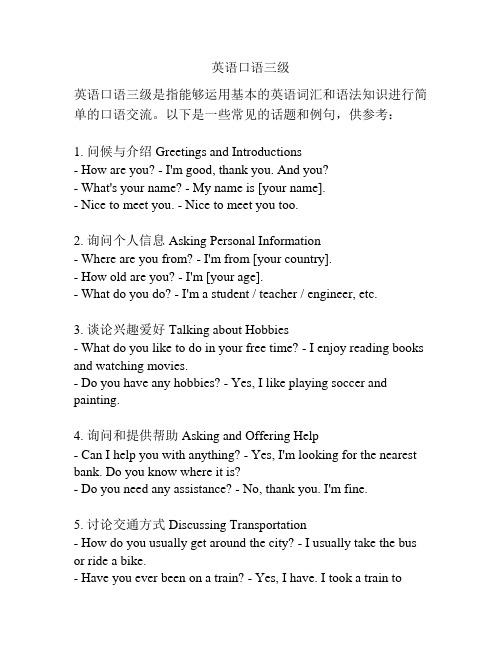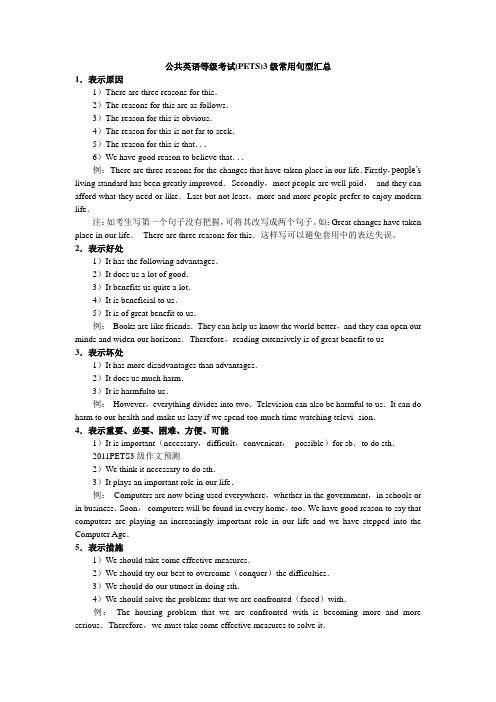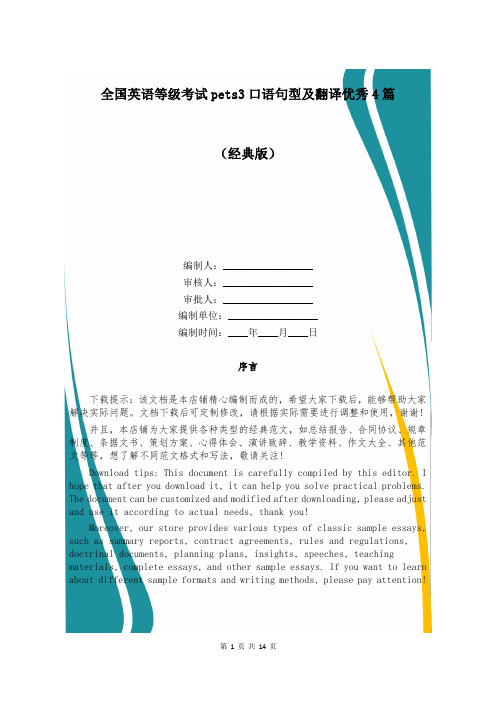全国英语等级考试三级口语重点句型讲解
公共英语pets三级口语考试内容详解

公共英语pets三级口语考试内容详解公共英语pets三级口语考试内容详解全国英语等级PETS考试,就是对信心、恒心、意志的磨练。
为帮助考生们更有准备参加考试,下面为大家带来公共英语pets三级口语考试内容详解,快来看看吧。
口语考试总共分为三部分第一,就是自述:自我介绍,有时也会由主考官来以提问的方式进行一系列介绍,比如:你的名字,你的籍贯,你的学校,你学习的专业等;第二,就是和搭档的对话:这个主要是配合,一般会给几幅图,你们互相选择之后,开始两个人的对话;这个主要看个人的口语能力和两个人的配合。
第三,就是有以副图,让你根据图说出自己的想法和观点自我介绍I am a primary school teacher.I teach my pupils how to use computer.My work allows students to learn more knowledge of computer.And students and I play together every day.But my job is very busy.And I always worry about subject achievement of my students I teach.周末活动At the weekend or holiday,I always go on a tour. I think each journey can improve myself in all aspects.未来计划I will improve my teaching skill,which is my future plan.Thus I will be able to let many students learn more knowledge from me.关于独自住还是和父母住I think children can live with their parents.The parents can help their children when we meet with any difficulties.口试:1.看图(小女孩骑在疲惫的爸爸背上)We can see from the picture that a girl is playing happily on her tired father——s back under the cruel sunlight. I think this phenomenon is associated with family——s education. At present, Our parents seriously dote on their child just due to only one child. It——s incorrect to dote on the child like the father. Respecting the older and caring about each other is crucial character to the child. Our parents should educate their child from trifles.2.书店买书We can see from the pictures that the child goes to bookstore and says in surprise :”so many reference books”. What the child says has revealed/shown the current stuation of education. The reference books are sold everywhere from the bookstore to the school. It is abnormal that the students pay more attention to the reference books but neglect the main textbooks. I suggest that declining some reference book is necessary for our students to correctly study knowledge.3. 孩子要买NIKE鞋We can see from the pictures that the young boy wants his mother to buy NIKE shoes for him, which reflects the trend of comparison between the children. Being lack of adequate funds, the children entirely depend on their parents.On the other hand , currently, the main task of the children is to study. The children should learn to remain economical in life.每次口试采取两名口试教师和两名考生的形式。
全国英语等级考试pets3三级常见语法解析

2019 年全国英语等级考试 pets3三级常有语法分析(4)虚假语气表示与客观事实相反的假设,由 if 虚假条件从句和主句构成。
一、虚假语气的基本内容依照虚假与其这类与事实相反的假设所对应的时间不一样样,虚假语气的 if 虚假条件从句与主句的谓语动词分别有三类构成形式:假设种类If 虚假条件从句主句与现在事实相反Did/were Would/should do与过去事实相反 Had done Would/should have done与将来事实可能相反Were to do/did/should do Would/should do例: 1、I wouldn't talk that way if I were Peter.2、If the whole operation had not been planned beforehand, a great deal of time and moneywould have been lost3、Jean doesn't want to work right away because shethinks that if she were to get a job she probably wouldn ’t be able tosee her friends very often.4、I would ask George to lend us the money if I knew him.5、Do you think there would be less conflict ( 战斗、斗争) in the world if all people spoke the same language.6、If Bob had come with us, he would have had a goodtime.二、 if 的省略形式( 又称虚假语气的倒装结构)在if 虚假条件从句中,若是谓语部分包含were,should ,had等词,则能够把这些词放到主语前,省略 if ,构成虚假语气的倒装结构。
三一口语三级第1-8讲 讲义(完整版)

GESE - Grade 3 Unit 1This is My School.I. Words & Phrases方位: next to(紧挨着), beside(在…旁边), behind(在…后面), in front of(在…前面),under(在…下面), on(在…上面), in(在…里面)学校: classroom building(教学楼), gym(体育馆), playground(操场), basketball court(篮球场), library(图书馆), dining hall(食堂), gate(大门), auditorium(礼堂), dormitory building(宿舍楼), sports field(运动场), swimming pool(游泳池), slide(滑梯), swing(秋千), floor(楼层,地面), the first floor(一楼), the second floor(二楼), the third floor(三楼), teacher’s office(教师办公室), clinic(医务室), washroom(洗手间), computer room(机房), music room(音乐教室), library(图书馆), piano(钢琴), violin(小提琴)描述性: big / large(大), small / little(小), new(新的), old(旧的), beautiful(美丽的), 运动: sport(运动), sports instruments(运动器材), do sports(做运动), table tennis(乒乓球), badminton(羽毛球),其他: introduce(介绍), describe(描述), laptop(笔记本电脑), finger(手指), fist(拳头), calendar(日历),II. Key sentences (“”表示可替换)1. There’s a / an … in my school. / There’re … in my school.2. My school is very … and … (big / small, large, old / new, beautiful)3. We usually do sports in the playground.III. Q&A (“”表示可替换)1. – Is there a ... in your school? – Are there … in your school?– Yes, there is. / No, there isn’t. – Yes, there are. / No, there aren’t.2. – Where is the gym?– The gym / It is next to the playground.3. – What do you do in the gym?– I usually do sports in the gym.4. – Can you introduce the gym in your school?–The gym is very big and beautiful. There’re many sports instruments there. I usually play badminton there.5. – Can you introduce / describe your school?(or “Tell me something about your school.”)–My school is very big and beautiful. There’re a classroom building, a library, a dining hall, a gym, a playground and some basketball courts in my school. I always study and play there. I love my school very much.6. – Which floor is the washroom on? / Where is the washroom?– The washroom is on the first floor.7. – Is the library on the second floor?– Yes, it is. / No, it isn’t.8. – What’s in the library?– There are many books and bookshelves in the library.9. – What do you do in the library?– I read books in the library.10. – How many classroom buildings are there in your school?– There’re three classroom buildings in my school.GESE - Grade 3 Unit 2What Does Your Father Do?I. Words & Phrases职业: teacher, student, doctor, nurse(护士), worker(工人), singer(歌手), dancer(舞蹈演员), artist(艺术家/画家), writer(作家), editor(编辑), engineer(工程师), computer programmer(计算机编程员), hairdresser(理发师), shop assistant(店员), seller (售货员), clerk(职员), accountant(会计), manager(经理), general manager(总经理), president of the board(董事长), soldier(士兵), policeman(警察), lawyer(律师), farmer(农民), cook(厨师), waiter(男服务生), waitress(女服务生), scientist(科学家), driver(司机), pilot(飞行员), tour guide(导游), judge(法官), reporter(记者), housewife(家庭主妇), stewardess(空姐/女乘务员), secretary(秘书)家庭: family member(家庭成员), father, mother, sister(亲姐妹), brother(亲兄/弟), cousin(堂/表兄弟姐妹), grandpa, grandma, uncle(叔/舅/伯/姨父/姑父), aunt(姑/姨/婶/舅妈)场所: office(办公室), hospital(医院), school(学校), factory(工厂), company(公司), shop/store(商店), shopping mall(卖场), super market(超市), barber(理发店), TV station(电视台), newspaper office(报社)II. Q&A (“”表示可替换)1. – How many people are there in your family?– There’re … people in my family.2. – Who are they?– They’re my father, my mother, my… and me.3. – What does your father do? / What’s your father?– My father is an engineer.4. – Where does he work?– He works in an office.5. – Is he a doctor?– Yes, he is. / No, he’s a cook.6. – Does he work in a hospital?– Yes, he is. / No, he isn’t. He works in a restaurant.7. – What do your parents do?– My father is a … My mother is a …8. – Where do they work?– My father works in … My mother works in …9. – Are they very busy?– Yes, they are. / No, they aren’t.10. – How do they go to work?– My father goes to work by car. / My father drives to work.My mother goes to work by subway / by bus / by foot.GESE - Grade 3 Unit 3What’s the date today?I. Words & Phrases月份: January(Jan.), February(Feb.), March(Mar.), April(Apr.), May, June(Jun.), July(Jul.), August(Aug.), September(Sep.), October(Oct.), November(Nov.), December(Dec.)日期: date(日期), Jan. 25(Jan. the twenty-fifth / January the twenty-fifth / the twenty-fifth of January)时间: hour(小时), half an hour(半小时), quarter(15分钟;四分之一), minute(分钟), second(秒), am(上午), pm(下午)II. Q&A (“” 表示可替换)1. – How many seconds are there in a / one minute?–There’re 60 seconds in a minute.2. – How many minutes are there in an hour?– There’re 60 minutes in an hour.3. – How many hours are there in a day?– There’re 24 hours in a day.4. – How many days are there in January?– There’re 31 days in January.5. – How many months are there in a season?– There’re 4 months in a season.6. – How many seasons are there in a year?– There’re 4 seasons in a year.7. – How many months are there in a year?– There’re 12 months in a year.8. – What’s the date today? / What date is it today? (Feb. 14)– It’s February the fourteenth. / It’s the fourteenth of February.9. – What day is today? / What day is it today?– It’s Wednesday.10. – What time is it (now)?– It’s nine o’clock. (9:00)It’s nine twenty-four. (9:24)It’s nine fifteen. / It’s a quarter past nine. (9:15)It’s nine forty-five. / It’s a quarter to ten. (9:45)It’s nine thirty. / It’s half past nine. (9:30)It’s 8:15 am. / It’s 10:45 pm.GESE - Grade 3 Unit 4When do you go to school?I. Words & Phrases短语: wake up(醒来), get up, one’s(某人的), brush one’s teeth(刷牙), wash one’s face(洗脸), have breakfast(吃早饭), go to school(上学), have classes(上课), have lunch(吃午饭), do sports(做运动), go home, have dinner/supper(吃晚饭), do homework(做作业), watch TV(看电视), go to bed(睡觉)学科: subject(学科), Chinese(语文), math(数学), English(英语), dancing lesson(舞蹈课)其他: am(上午), pm(下午), at the weekend(周末) , at school(在学校), after school(放学后), at home(在家), once(一次), twice(两次), three times(三次) II. Q&A (“” 表示可替换;根据实际情况回答)1. – When do you get up in the morning? (when = what time)–I usually get up at six o’clock. Sometimes I get up at seven o’clock, because I have no lesson at the weekend.2. – When do you have breakfast?– I usually have breakfast at seven o’clock. Sometimes I have breakfast at half past seven, because I get up late.3. – What time do you go to school?– I go to school at 7:30.4. – What subjects do you have?– I have math, English, Chinese, PE, music, art and science. I like English best, because I like to speak English.5. – What do you usually do after school / in the evening?– I usually have dinner at six o’clock. Then I do my homework. SometimesI watch TV after diner.6. – Do you have any lessons at the weekend?– Yes, I have English lessons on Saturday and on Sunday I have a math lesson.–No, I don’t have any lessons on Saturday and Sunday, so I can play with my friends. I love my weekend.7. – What do you usually do at the weekend?–I have some lessons on Saturday and on Sunday I usually play basketball with my friends.8. – How often do you play basketball?– I play basketball twice a week.GESE - Grade 3 Unit 6What are they doing?I. Words & Phrases短语: write a letter(写信), do one’s homework, teach English, read books, watch TV, sweep the floor(扫地), clean the bedroom(打扫卧室), water the flowers(浇花), set the table(摆餐桌), listen to music, play soccer(踢足球), ride a bike, ride a horse(骑马), do exercises(锻炼、做操), fly a kite, play chess(下棋), play the violin(拉小提琴), play the piano(弹钢琴), play the drum(打鼓), play baseball(打棒球), play volleyball(打排球), climb the mountain(爬山)特殊的动词ing形式: take(taking), make(making), have(having), ride(riding), write(writing), dance(dancing), hike(hiking), set(setting), jog(jogging), run(running), swim(swimming),其他: hike(远足), fish(钓鱼)II. Q&A (根据实际情况回答)1. – What are you doing?– I’m watering the flowers.2. – What’s he doing?– He’s fishing.3. – What’s she doing?– She’s playing the violin.4. – What are they doing?– They’re playing volleyball.5. – Is he running?– Yes, he is.6. – Is she riding a bike?– No, she’s riding a horse.7. – What is Kate doing?– She’s hiking.8. – Is Mary playing a game?– No, she’s playing a drum.GESE - Grade 3 Unit 7What’s the weather like today?I. Words & Phrases天气:sunny(晴朗的), cloudy(多云的), windy(大风的), rainy(下雨的), raining(正在下雨), snowy(下雪的), snowing(正在下雪), foggy(雾天), stormy(暴风雨/雪天气), lightning(闪电,打闪), hailing(在下冰雹), cold(寒冷的), cool(凉爽的), warm(温暖的), hot(炎热的), wet(潮湿的), dry(干燥的), nice weather(好天气), bad weather(坏天气)其他:have a picnic(野餐), stay home(待在家), in the rain(在雨中), take a walk(散步), in general(总的来说), I’d rather… (我宁愿…)II. Q&A (“” 表示可替换)1. – Nice day, isn’t it? (天气不错,是吧?)Let’s go and have a picnic.– That’s a good idea. (好主意!)2. – What’s the weather like today? / How’s the weather today?– We have bad weather again. It’s cold and windy.3. – Is it snowing?– Yes, it is. / No. It’s raining.4. – What was the weather like yesterday?– It was foggy yesterday.5. – Was it cloudy yesterday?– Yes, it was. / No, it was snowy yesterday.6. – How many seasons are there in a year?– There’re four seasons in a year.7. – What’s the weather like here in spring?– It’s usually cold and dry here in spring.But in general, it’s getting warmer and warmer.8. – Is it cold in Beijing (or “here”) in summer?– No, it’s usually very hot and wet here in summer.9. – What do you like to do in winter?– I like to skate and make a snowman in winter.10. – Do you like to fly a kite in autumn?– Yes I do. / No. I like to … in autumn.11. – When can you make a snowman?– I can make it in winter.12. – When is winter?– Winter is (lasting) from December to February here in Beijing.13. – Do you like to take a walk on rainy days?– Yes, I do. / No. I’d rather stay at home on rainy days.14. – What do you want to do on rainy days?– I want to stay at home with my parents.15. – What do you like to do on sunny days?– I like to go outside and play with my friends.GESE - Grade 3 Unit 8Where were you yesterday morning?I. Words & PhrasesBe动词: was(“be”过去式单数), were(“be”过去式复数.)其他: schedule(日程表); sunny, rainy, snowy(雪天), windy, cloudy, foggy(雾天) 场所: at home(在家), at school(在学校上课), in the garden(在花园), in the playground(在操场), in the hospital(在医院), in the store(在商店), in the bank(在银行), in the park(在公园)II. Q&A (“” 表示可替换)1. – Where were you yesterday?– I was at school (yesterday).2. – Were you at home the day before yesterday?– Yes, I was. / No, I was in the park.3. – Where were the pencils this morning?– The pencils were on the sofa this morning.4. – What was the weather like yesterday?– It was foggy yesterday.5. – Was it cloudy yesterday?– Yes, it was. / No, it was snowy yesterday.6. – What day was it yesterday?– It was Friday (yesterday).7. – Was it Saturday yesterday?– Yes, it was. / No, it was Sunday (yesterday).8. – Wasn’t it Wednesday yesterday?– No. It was Thursday yesterday.9. – What was the date yesterday?– It was Jan. 5 (yesterday).10. – When is your birthday?– My birthday is on February 18.GESE - Grade 3 Unit 9How can I get to the library?I. Words & Phrases问路:turn right(右转), turn left(左转), on the right / on one’s right(在右边), on the left / on one’s left(在左边), walk along / go along / go down(沿...一直走), walk across / go across(穿过...)其他:turning(转弯处), crossing(十字路口), traffic lights(交通灯), zebra crossing(斑马线), street(大街), road(路)地标:library(图书馆), classroom building(教学楼), dining-hall(食堂), gym(体育馆), swimming pool(游泳池), store(商店),department store(百货商场), bookstore(书店), bank(银行), park, cinema(电影院), bus stop(汽车站), hotel / inn(酒店,宾馆), post office(邮局), theatre(剧院), supermarket(超级市场), restaurant(餐馆), subway station(地铁站), railway station(火车站), police station(警察局), university(大学), bakery(面包房)II. Q&A (“” 表示可替换)1. – Excuse me. How can I get to the classroom building?– Walk along this road and turn left at the second turning.2. – Excuse me. Do you know how to get to the theatre?– Of course. Go down this street and take the third crossing on the right.Walk along. The theatre is on your left.3. – Excuse me. Could you tell me the way to the restaurant?– Sure. Go along this road. Get to Street 1 and turn left.Then you can see the restaurant on your right.4. – Excuse me. Do you know the way to the railway station?– Yes. Go straight ahead for about 100 meters.Then you will find it on your left. You won’t miss it.。
全国英语等级考试三级口语重点句型讲解

全国英语等级考试三级口语重点句型讲解全国英语等级考试三级口语重点句型讲解学会学习的'人,是非常幸福的人。
以下是店铺为大家搜索整理的全国英语等级考试三级口语重点句型讲解,希望能给大家带来帮助!1.Food and Drink1)常用句子No more, thank you.够了,谢谢。
No, I won't have any more, thank you.不了,谢谢你,我再也吃不下了。
Just a little, please.只要一点儿。
May I have just a little to taste? We don't have it in my country.我只要一点尝尝好吗?我们国家没有这东西。
No, thank you.不要了,谢谢。
No, I enjoyed it very much, but I won't have any more.不,我很喜欢,可是再也吃不下了。
Can I pass you anything?要我递给你什么吗?Do you take salt, or pepper?你要盐还是胡椒?Shall I cut you some bread我给你切些面包好吗?2)常见重量、衡量单位half-pint(1/2 pt.) 半品脱pint (pt.) 品脱quart (qt.) 夸脱gallon(gal.) 加仑ounce(oz.) 盎司quarter-pound(1/4 1b) 四分之一磅half-pound(1/2 1b) 半磅pound (1b) 磅LIQUID MEASURES 液量3)食品分类dairy: milk, butter, cheese乳制品:牛奶奶油干poultry: chicken, turkey, duck, goose家禽:鸡火鸡鸭鹅meat: beef, pork, lamb, veal,肉:牛肉肉羊肉小牛肉chops, fillet, steak, roast, 碎肉去骨肉片排骨烤肉leg of..., breast of……腿肉……胸脯肉fish: sole, flounder, cod, fillet鱼:鲽鱼比目鱼鳝鱼去骨鱼片1. Personal Identification, PeopleI'm a teach/student/worker...2. Home and Family, Environment1)常用句式Do you have any elder brothers?你有没有哥哥?Where does your father work?你父亲在哪工作?What's your father?你父亲是干什么的?How many people are there in your family?请问,你家有几口人?I have father, mother and a younger sister.我有父亲、母亲和妹妹。
英语口语三级

英语口语三级英语口语三级是指能够运用基本的英语词汇和语法知识进行简单的口语交流。
以下是一些常见的话题和例句,供参考:1. 问候与介绍 Greetings and Introductions- How are you? - I'm good, thank you. And you?- What's your name? - My name is [your name].- Nice to meet you. - Nice to meet you too.2. 询问个人信息 Asking Personal Information- Where are you from? - I'm from [your country].- How old are you? - I'm [your age].- What do you do? - I'm a student / teacher / engineer, etc.3. 谈论兴趣爱好 Talking about Hobbies- What do you like to do in your free time? - I enjoy reading books and watching movies.- Do you have any hobbies? - Yes, I like playing soccer and painting.4. 询问和提供帮助 Asking and Offering Help- Can I help you with anything? - Yes, I'm looking for the nearest bank. Do you know where it is?- Do you need any assistance? - No, thank you. I'm fine.5. 讨论交通方式 Discussing Transportation- How do you usually get around the city? - I usually take the bus or ride a bike.- Have you ever been on a train? - Yes, I have. I took a train toanother city last year.6. 点菜 Ordering Food- What would you like to order? - I would like a bowl of noodles, please.- Do you have any dietary restrictions? - Yes, I'm a vegetarian.7. 时间和日期 Time and Date- What day is it today? - Today is Monday.- What time is it now? - It's 3 o'clock in the afternoon.这些例句可以帮助你开始进行简单的英语口语交流。
公共英语等级考试(PETS)3级常用句型汇总

公共英语等级考试(PETS)3级常用句型汇总1.表示原因1)There are three reasons for this.2)The reasons for this are as follows.3)The reason for this is obvious.4)The reason for this is not far to seek.5)The reason for this is that...6)We have good reason to believe that...例:There are three reasons for the changes that have taken place in our life.Firstly,people’s living standard has been greatly improved.Secondly,most people are well paid,and they can afford what they need or like.Last but not least,more and more people prefer to enjoy modern life.注:如考生写第一个句子没有把握,可将其改写成两个句子。
如:Great changes have taken place in our life.There are three reasons for this.这样写可以避免套用中的表达失误。
2.表示好处1)It has the following advantages.2)It does us a lot of good.3)It benefits us quite a lot.4)It is beneficial to us.5)It is of great benefit to us.例:Books are like friends.They can help us know the world better,and they can open our minds and widen our horizons.Therefore,reading extensively is of great benefit to us3.表示坏处1)It has more disadvantages than advantages.2)It does us much harm.3)It is harmfulto us.例:However,everything divides into two.Television can also be harmful to us.It can do harm to our health and make us lazy if we spend too much time watching televi- sion.4.表示重要、必要、困难、方便、可能1)It is important(necessary,difficult,convenient,possible)for sb.to do sth.2011PETS3级作文预测2)We think it necessary to do sth.3)It plays an important role in our life.例:Computers are now being used everywhere,whether in the government,in schools or in business.Soon,computers will be found in every home,too.We have good reason to say that computers are playing an increasingly important role in our life and we have stepped into the Computer Age.5.表示措施1)We should take some effective measures.2)We should try our best to overcome(conquer)the difficulties.3)We should do our utmost in doing sth.4)We should solve the problems that we are confronted(faced)with.例:The housing problem that we are confronted with is becoming more and more serious.Therefore,we must take some effective measures to solve it.6.表示变化1)Some changes have taken place in the past five years.2)A great change will certainly be produced in the world's communications.3)The computer has brought about(导致)many changes in education.例:Some changes have taken place in people's diet in the past five years.The major reasons for these changes are not far to seek.Nowadays,more and more people are switching from grain to meat for protein,and from fruit and vegetable to milk for vitamins7.表示事实、现状1)We cannot ignore the fact that...2)No one can deny the fact that...3)There is no denying the fact that...4)This is a phenomenon that many people are interested in.5)However,that's not the case.例:We cannot ignore the fact that industrialization brings with it the problems of pollution.To solve these problems,we can start by educating the public about the hazards(危害)of pollution.The government on its part should also design stricter laws to promote a cleaner environment8.表示比较1)Compared with A,B...2)I prefer to read rather than watch TV.3)There is a striking contrast between them.例:Compared with cars,bicycles have several advantages besides being affordable.Firstly,they do not consume natural resources of petrol(石油).Secondly,they do not cause the pollution problem.Last but not least,they contribute to people's health by giving them due physical exercise.9.表示数量1)It has increased(decreased)from...to...2)The population in this city has now increased (decreased)to 800,000.3)The output of July in this factory increased by 15%compared with that of January.例:With the improvement of the living standard,the proportion(比例)of people's income spent on food has decreased while that spent on education has increased.再如:From the graph listed above,itcan be seen that student use of computers has increased from an average of less than two hours per week in 1990 to 20 hours in 2000.注:"From the graph listed above,it can be seen that"见句式12。
全国英语等级考试pets3口语句型及翻译优秀4篇

全国英语等级考试pets3口语句型及翻译优秀4篇(经典版)编制人:__________________审核人:__________________审批人:__________________编制单位:__________________编制时间:____年____月____日序言下载提示:该文档是本店铺精心编制而成的,希望大家下载后,能够帮助大家解决实际问题。
文档下载后可定制修改,请根据实际需要进行调整和使用,谢谢!并且,本店铺为大家提供各种类型的经典范文,如总结报告、合同协议、规章制度、条据文书、策划方案、心得体会、演讲致辞、教学资料、作文大全、其他范文等等,想了解不同范文格式和写法,敬请关注!Download tips: This document is carefully compiled by this editor. I hope that after you download it, it can help you solve practical problems. The document can be customized and modified after downloading, please adjust and use it according to actual needs, thank you!Moreover, our store provides various types of classic sample essays, such as summary reports, contract agreements, rules and regulations, doctrinal documents, planning plans, insights, speeches, teaching materials, complete essays, and other sample essays. If you want to learn about different sample formats and writing methods, please pay attention!全国英语等级考试pets3口语句型及翻译优秀4篇全国英语等级考试是教育部考试中心设计并负责的全国性英语水平考试体系。
公共英语三级口语考试句型学习

公共英语三级口语考试句型学习公共英语三级口语考试句型学习引导语:公共英语三级口语考试句型学习,由应届毕业生培训网整理而成,谢谢您的阅读。
1、 I don't ever want to have the effect on a person that this person had on me, where i was just blown away by disappointment. It took a few years to get over it.这个句子中重点解析的是“ever”的意思。
翻译为:我甚至从未想过要给“给我留下印象的人”留下印象,在这一点上我感到十分失望。
我用了许多年才克服这个毛病。
ever,在否定句中起加强语气的作用,not ever从未。
2、 One thing I do is work with Make-A-wish. If an ill child’s one wish to see a celebrity and he picks me, then I make time to see him. But I have to be very careful with these kids, because if you get too attached, you’re just setting yourse lf up for loss.这个句子中重点解析的是” because if you get too attached, you’re just setting yourself up for loss.”的意思。
翻译为:我做的一件事就是带着许愿做事。
如果一个病了的孩子的愿望是想看一个名瓦并且他选择的是我,然后我抽出时间去看望他。
但是我必须非常小心的跟这些孩子相处,因为如果你太依恋,你会感到不舍。
because if you get too attached, you’re just setting yourself up for loss.因为如果你太依恋,你会感到不舍。
- 1、下载文档前请自行甄别文档内容的完整性,平台不提供额外的编辑、内容补充、找答案等附加服务。
- 2、"仅部分预览"的文档,不可在线预览部分如存在完整性等问题,可反馈申请退款(可完整预览的文档不适用该条件!)。
- 3、如文档侵犯您的权益,请联系客服反馈,我们会尽快为您处理(人工客服工作时间:9:00-18:30)。
全国英语等级考试三级口语重点句型讲解
学会学习的人,是非常幸福的人。
以下是店铺为大家搜索整理的全国英语等级三级口语重点句型讲解,希望能给大家带来帮助!更多精彩内容请及时关注我们应届毕业生!
1.Food and Drink
1)常用句子
No more, thank you.够了,谢谢。
No, I won't have any more, thank you.不了,谢谢你,我再也吃不下了。
Just a little, please.只要一点儿。
May I have just a little to taste? We don't have it in my country.
我只要一点尝尝好吗?我们国家没有这东西。
No, thank you.不要了,谢谢。
No, I enjoyed it very much, but I won't have any more.不,我很喜欢,可是再也吃不下了。
Can I pass you anything?要我递给你什么吗?
Do you take salt, or pepper?你要盐还是胡椒?
Shall I cut you some bread我给你切些面包好吗?
2)常见重量、衡量单位
half-pint(1/2 pt.) 半品脱
pint (pt.) 品脱
quart (qt.) 夸脱
gallon(gal.) 加仑
ounce(oz.) 盎司
quarter-pound(1/4 1b) 四分之一磅
half-pound(1/2 1b) 半磅
pound (1b) 磅
LIQUID MEASURES 液量
3)食品分类
dairy: milk, butter, cheese
乳制品:牛奶奶油干
poultry: chicken, turkey, duck, goose
家禽:鸡火鸡鸭鹅
meat: beef, pork, lamb, veal,
肉:牛肉肉羊肉小牛肉
chops, fillet, steak, roast, 碎肉去骨肉片排骨烤肉
leg of..., breast of
……腿肉……胸脯肉
fish: sole, flounder, cod, fillet
鱼:鲽鱼比目鱼鳝鱼去骨鱼片
1. Personal Identification, People
I'm a teach/student/worker...
2. Home and Family, Environment
1)常用句式
Do you have any elder brothers?你有没有哥哥?
Where does your father work?你父亲在哪工作?
What's your father?你父亲是干什么的?
How many people are there in your family?请问,你家有几口人?
I have father, mother and a younger sister.我有父亲、母亲和妹妹。
Where do you live?你住哪儿?
I live in Bejing. I'm a middle school student.我家在北京,我是一名中学生。
Does your mother work, too?你母亲也工作吗?
She has already retired.她已退休了。
I'm a freshman in senior class.我是高一新生。
How's your grandpa?你爷爷(姥爷)好吗?
Is your elder sister maried?你姐姐结婚了吗?
He works in a bank.他在银行工作。
How old is your father?你父亲多大年纪了?
My parents have two children, my sister and me.我父母有两个孩子,我妹妹和我。
2)常用对话
My Mother and Father Are Older Than I
Teacher: Peter, do you have any brothers and sisters?
Peter: Yeah.
Teacher: Do you study English by yourself or in a class?
Peter: I study in a class. I don't study by myself.
Teacher: Do you prefer to go to the movies by yourself or with a friend?
Peter: I prefer to go to the movies with a friend. I don't like to go by myself.
Teacher: Do you live by yourself or with your family?
Peter: Of course with my family.
Teacher: Incidentally, Peter, are you the oldest person in your family?
Peter: No, my mother and father are older than I.
3. Weather and Climate
1)询问天气情况时常用的句式
How's the weather tomorrow?
明天的天气怎么样?
Is the weather always like this?
天气老是这样吗?
What does the weather forecast say?
天气预报怎么说的?。
